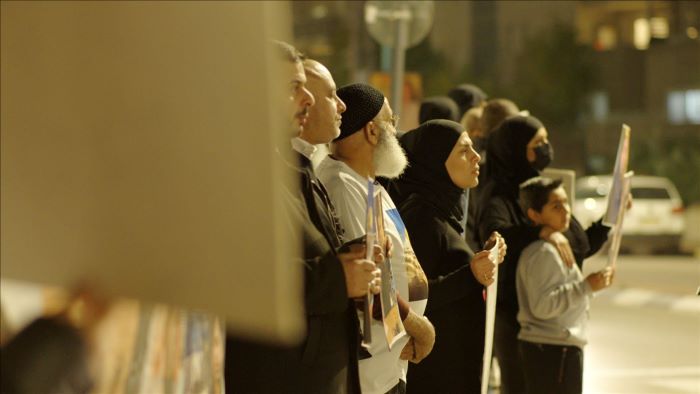
A protest calling for justice in the killing of Musa Hassuna in Mourning in Lod (MTV Documentary Films)
The city of Lod is about 45 kilometers west of Jerusalem and 86 km north of the Gaza Strip. It is, to this day, a city where Arabs and Jews live. There are, we are told, many on both sides who want to live in peaceful coexistence. They do not, however, live in a world where this belief is universally shared. On May 10, 2021, Musa Hassuna, an Arab man who had always believed in peace, was shot by a settler, who was waving an Israeli flag, while he engaged in a peaceful protest. More protests erupted all over the city and elsewhere. Roughly 24 hours later, Yigal Yehoshua, an Israeli man who was determined to treat Arabs as equals, was killed when a rock, thrown by a protester, crashed through his car window and hit him in the head.
Yehoshua’s family made the difficult decision to donate his organs. He was, according to their testimony, someone who always wanted to help people, and they believed it was what he would have wanted. Not long after, one of his kidneys went to an Arab Christian woman, Randa Aweis, who had been struggling for years with unsuccessful dialysis treatments. The transplant saved her life.
Mourning in Lod follows these three families in the fallout of two tragedies and one godsend, with a conscious effort to emphasize the goodness of the figures at the center of them: Hassuna, Yehoshua, and Aweis. In each case, the point is hammered home that they are all family people dedicated to peace, but at the mercy of injustice and circumstance. Footage of their family life, as well as from where the killings took place, is assembled to this end. The mourning process for the two men is documented as well. Yehoshua’s 30-day shivah is attended briefly by Aweis and her family, where Yehoshua’s brother Efi and widow go out of their way to make them feel comfortable. Other guests gaze at them in suspicion. The trial of Yehoshua’s assailants is successful in that his killers are imprisoned. Hassuna’s trial, by contrast, is downright offensive: His killers walked free on the plea that they acted in self-defense.
It will be fascinating to see how this film lands. Director Hilla Medalia has stated that she finished making it six months before the attacks on October 7th, having believed that the bulk of this wave of violence had passed. To say that this has not been the case would, of course, be an understatement. The film’s sound designer, Lior Weitzman, was among 1,200 Israelis to have been killed in Hamas’s attack. Tens of thousands of Palestinians have been killed since.
The film aims to celebrate the redemptive power of human goodness amid great tragedy, focusing particularly on Efi and Marwa (Hassuna’s father), who are able to speak to each other and acknowledge that both Yehoshua and Hassuna deserve justice, that Jews and Arabs should be able to live together peacefully. They are able to do this even after a question has been raised as to whether some members of Hassuna’s family were involved in Yehoshua’s killing. In other words, these two are dedicated to equity without sliding into fanaticism.
The film also reveals this incredible strain. The two parties (Arabs especially) speak as though under forced obligation to insist that they do not hate the other side, yet we hear Efi blurt out (understandably) that he cannot see his brother’s killers as human; see Marwa protesting with incredible fervency as armed Israeli soldiers surround him and other protestors; and notice the distrust, even offense, on the faces of many when Aweis and her family attend the shiva.
What this film achieves is to highlight how innocent people on both sides are destroyed by conflicts while also making clear the differences in their circumstances. Yehoshua’s family mourns for him without harassment. Hassuna’s family, when they protest his killing that has still not been justly punished, do so surrounded by Israeli soldiers and settlers waving the Israeli flag behind a picket line.






Well-written with insightful acknowledgment regarding the strain on all sides.